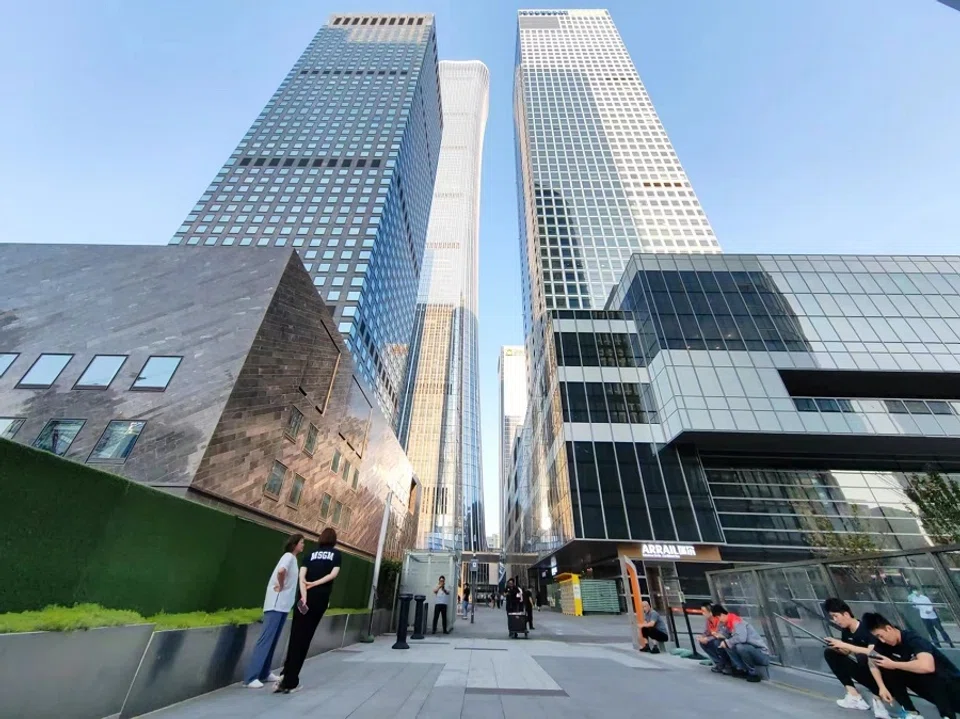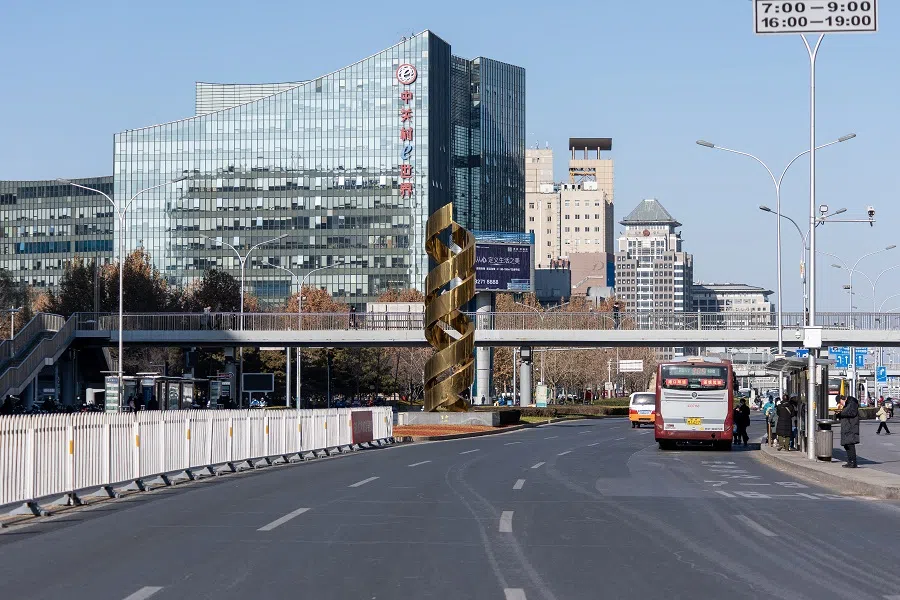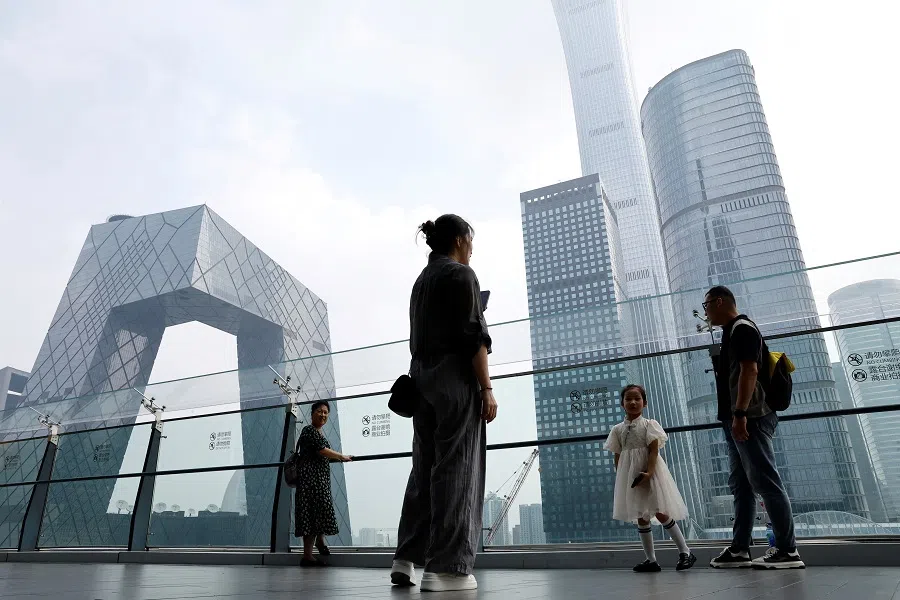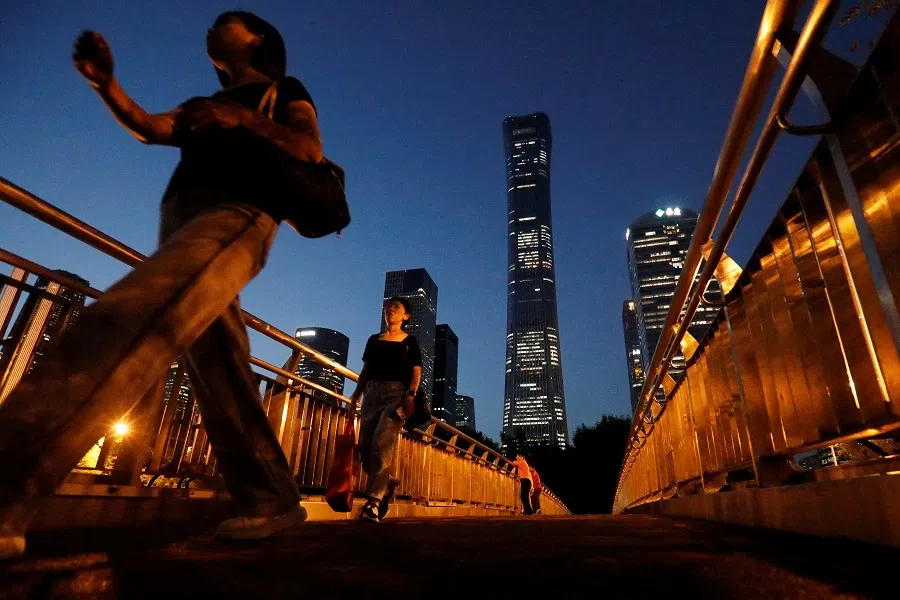Vacancy at an all-time high as companies move out of Beijing's prime office space
Despite the lifting of Covid-19 restrictions, the office vacancy rate in China's capital Beijing has not recovered, and is set to increase. From considerations such as rental cost and traffic, internet companies are opting to move out of prime central locations. Lianhe Zaobao journalist Meng Dandan tells us more.

In August, a construction technology company in Beijing joined the wave of renters moving out from office buildings in Zhongguancun, relocating from Zhichun Road where there is a concentration of major internet companies, to outside of the 5th Ring Road at Cuihu Science Park.
Company founder Li Xinhe told Lianhe Zaobao that since the move, his company's office space expanded by nearly 100 square metres, and rental cost has been cut in half, at 3 RMB (US$0.41) per square metre per day.
Moving outside of 5th Ring Road
Since China loosened its Covid-19 restrictions, the vacancy rate in Beijing's office buildings has not recovered but instead increased. According to statistics from real estate services provider Savills, the vacancy rate for office buildings in Beijing in the second quarter of this year sat at 18.3%, a record high in the last 13 years.
Particularly in Beijing's Zhongguancun, where key players of the internet industry are concentrated, the share of vacant facilities in Grade A office buildings shot up to 18.1% in the second quarter of this year, from 2% at the end of 2020.
Li shared that his company moved from a prime location in Zhongguancun to outside of the 5th Ring Road not because the business was shrinking, but instead to rent a larger space at lower cost to boost the company's development.
... the internet technology firms ending their leases has left a large chunk of office space vacant, and caused the average rental fees for office buildings to fall.

He said, "Rent, transportation and other business expenses have gone down by quite a bit... outside of the 5th Ring Road, be it buying meals or parking fees, it's all significantly cheaper. There are also no traffic jams, so I save some time as well."
Given the weak economy, businesses are generally paying more attention to cost control. Tin Sun, head of research for northern China at commercial real estate services provider CBRE Group Inc, told Lianhe Zaobao that there is a high percentage of unrented space at office buildings in Zhongguancun.
He noted that this is due to leading internet companies such as ByteDance moving to their own properties. Moreover, some emerging companies also chose to move outside of the 5th Ring Road to tech parks with lower rents, while other firms are no longer looking to rent office space as they could not match up to the competition in the information technology industry and were pushed out.
According to reports by Chinese media, in 2022 ByteDance relocated to Zhongkun Plaza which they own, vacating a space of more than 100,000 square metres in the office building at Zhongguancun. Video streaming website iQIYI also moved out from the Hongcheng Tuozhan Mansion, leaving a space of 30,000 square metres in the heart of Zhongguancun. Other internet companies such as JD and Tencent also moved some departments away from the area.
Besides Zhongguancun, which houses numerous internet companies as tenants, office buildings in key areas such as Beijing's Wangjing, Guomao and Chang'an Avenue are also facing rental issues.
Attracting tenants with lower rents and more shared spaces
As main tenants in the Beijing office building market, the internet technology firms ending their leases has left a large chunk of office space vacant, and caused the average rental fees for office buildings to fall.

According to a report by real estate consultancy firm CRIC (克而瑞), average rental fees per day for Grade A office buildings in Beijing fell to 10.32 RMB per square metre in the second quarter of this year, compared with 12.15 RMB per square metre in the first quarter of 2020.
Besides Zhongguancun, which houses numerous internet companies as tenants, office buildings in key areas such as Beijing's Wangjing, Guomao and Chang'an Avenue are also facing rental issues.
A leasing agent with seven years of experience in the office building sector, Zhang, stated that many of his clients looking to rent in Beijing's office buildings this year "are moving from the 2nd to the 3rd Ring Road, and from inside to outside of the city".
Based on his recollection, Beijing's office property market was completely different five years ago: tenants would sign the lease immediately after the viewing if they were satisfied. They rarely negotiated, much less compared prices.
He said, "Property owners didn't have to worry about not being able to lease their property either. Whenever we brought clients to a viewing, we only dared to call the property owner when we were downstairs. It's the opposite scenario now - as soon as property owners hear that we're bringing a quality client over, they would already be preparing coffee and snacks."

Beijing office property owners who had a stable flow of tenants without lifting a finger are now starting to change their strategies to save themselves. To fight for tenants amid intense competition, some new office buildings directly reduce rent while others offer free shared spaces as a form of rental reduction.
China Zun (or CITIC Tower), Beijing's tallest building with the highest rent in the capital city, has recently been forced to lower its rent. China Times (《华夏时报》) reported that the monthly rent for available office space in China Zun has currently fallen to 600 RMB per square metre from 620 RMB in 2020, with room for more downward adjustment.
... the tenants are instead turning to emerging business districts with more affordable rent because of their lower budgets.
At the nearby Zhongxiu Building (众秀大厦), the new Grade A office building constructed in 2021 near China Zun, I observed that its marketing staff would always benchmark the building's selling points against China Zun, asserting that its rent is much lower and that it offers free customised renovation as well as shared spaces such as pantries, reception rooms and gyms.
Emerging business districts becoming more attractive
As office buildings in Beijing's core districts are doing all they can to secure tenants with lower rent, the tenants are instead turning to emerging business districts with more affordable rent because of their lower budgets.
Situated in Beijing's Fengtai district between the 2nd and 3rd Ring Roads in the southwest of the city, Lize Financial District saw its office rentals rise over the past two years due to its lower rents, newer buildings and gradually improving transport system and other infrastructure.

Data from CRIC showed that in the second quarter of this year, the vacancy rate of Grade A offices in Lize Financial District dropped by 8.2 percentage points year-on-year to 34.3%, with rents rising to 6.4 RMB per square metre per day.
Tin Sun said that while Lize, Tongzhou and other emerging areas raised the office vacancy rate of the entire city, they have also become the main drivers of Beijing's office property market this year.
He believes that Beijing's office buildings will still be under pressure in the latter half of the year. "The economy is still recovering and many tenants hope to have a better office environment but are still sensitive about cost. Coupled with the larger supply this year, rents are not at a point where they can rise," he noted.
However, Sun does not think that Beijing's office buildings will stay vacant for long. Looking at the prospects of Beijing's Grade A office buildings in the next two to three years, he is optimistic that "the vacancy rate will significantly decrease".
He said, "Compared with other first-tier cities, Beijing's supply in the city centre will still be limited in the next two to three years. But as demand slowly recovers next year, it will reach a healthy market level."
This article was first published in Lianhe Zaobao as "经济复苏缓慢 北京办公楼空置率居高不下".
Related: Can new policies revive China's home sales? | The dangerous link between China's real estate demise, the economy and the financial system | China needs a new model of economic development to revive the economy | Shanghai's falling property prices indicate economic gloom in China | China's first half GDP growth: Has the economy bottomed out?





